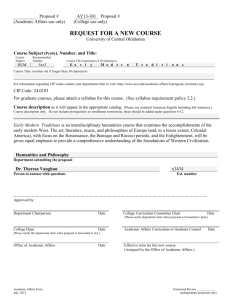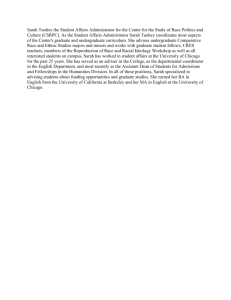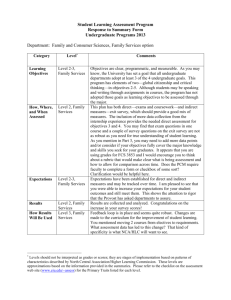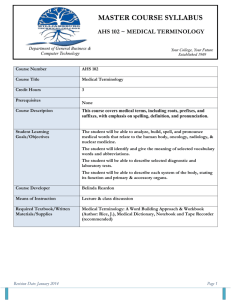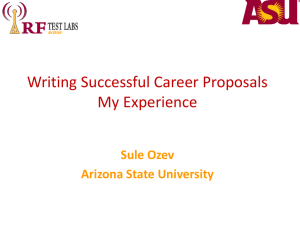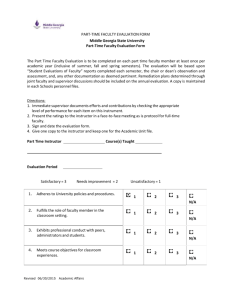AY11-603 - University of Central Oklahoma
advertisement
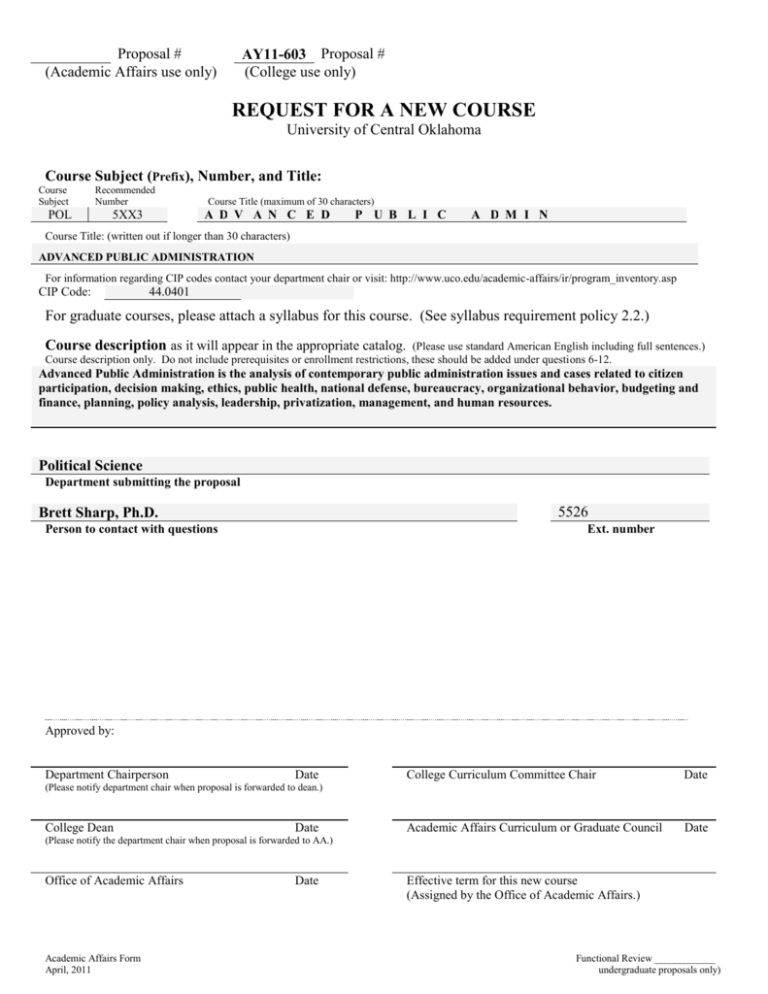
Proposal # (Academic Affairs use only) AY11-603 Proposal # (College use only) REQUEST FOR A NEW COURSE University of Central Oklahoma Course Subject (Prefix), Number, and Title: Course Subject POL Recommended Number 5XX3 Course Title (maximum of 30 characters) A D V A N C E D P U B L I C A D M I N Course Title: (written out if longer than 30 characters) ADVANCED PUBLIC ADMINISTRATION For information regarding CIP codes contact your department chair or visit: http://www.uco.edu/academic-affairs/ir/program_inventory.asp CIP Code: 44.0401 For graduate courses, please attach a syllabus for this course. (See syllabus requirement policy 2.2.) Course description as it will appear in the appropriate catalog. (Please use standard American English including full sentences.) Course description only. Do not include prerequisites or enrollment restrictions, these should be added under questions 6-12. Advanced Public Administration is the analysis of contemporary public administration issues and cases related to citizen participation, decision making, ethics, public health, national defense, bureaucracy, organizational behavior, budgeting and finance, planning, policy analysis, leadership, privatization, management, and human resources. Political Science Department submitting the proposal 5526 Brett Sharp, Ph.D. Person to contact with questions Ext. number Approved by: Department Chairperson Date College Curriculum Committee Chair Date Academic Affairs Curriculum or Graduate Council Date (Please notify department chair when proposal is forwarded to dean.) College Dean Date (Please notify the department chair when proposal is forwarded to AA.) Office of Academic Affairs Academic Affairs Form April, 2011 Date Effective term for this new course (Assigned by the Office of Academic Affairs.) Functional Review ____________ undergraduate proposals only) 1. Does this course have an undergraduate / graduate counterpart? X Yes No 2. Is this proposal part of a larger submission package including a program change? X Yes No 3. Does this new course affect a teacher preparation program? Yes X No If yes, send copy of proposal to the Associate Dean, College of Education and Professional Studies for review and provide date the Assoc. Dean was contacted with discussion results. Note: If yes, completed proposal requires Council on Teacher Education recommendation. 4. Has this course been previously taught as a common course (4910 seminar, 4960 institute, etc.)? X Yes No If yes, when was the most recent offering? Spring 2011 5. Does this course affect majors or minors outside the department? Yes If yes, provide name(s) of department chair(s) contacted, the dates, and the results of the discussion. X No 6. Prerequisite courses: Example 1: MATH 1213 and (MATH 2165 or MATH 2185) and CHEM 1213 Example 2: (ACCT 2113 and 2213) and (MGMT 3013 or ISOM 3613) Example 3: 8 hours of biology including BIO 1404 N/A 7. Co-requisite(s): N/A Which of the above prerequisite courses, if any, may be taken in the same semester as the proposed new course? 8. Concurrent enrollment: N/A Courses that must be taken the same semester. Example: lab courses. 9. Will this course have enrollment restrictions? Yes No If No, go to question 13. X 10. Specify which major(s) may or may not take this course. Specifying a major, excludes all other majors from enrolling. Check one: May May not Major Code: 11. Which of the following student classification(s) may enroll in this course? Graduate Graduate Post Baccalaureate Senior Junior Sophomore Freshman (2) 19 + hours (1) 0-18 hours Check all that apply: X X X 12. Check or list other restrictions for this course. Admission to Graduate Programs Admission to Nursing Program Admission to Teacher Education Other Academic Affairs Form April, 2011 Functional Review ____________ undergraduate proposals only) 13. Course objectives: Objectives should be observable, measurable and include scholarly or creative activities to meet the course level characteristics. Course objectives should also be in line with the course description. (Please refer to instructional objectives documents at: http://www.uco.edu/academic-affairs/faculty-staff/aacc.asp#FAQ/Helpful%20Hints.) Upon completion of this course, students will be able to: 1. 2. 3. 4. 5. 6. 7. Describe the historical development of the executive branch of government in the context of the structures and processes of American government. Examine how administrative work is influenced by culture, religion, organizational dynamics, formal rules, professional standards, business and industry standards, bureaucratic restraints, and democratic norms. Assess the influence of values conflicts surrounding administrative decisions. Critically analyze the current political, social, and economic issues confronting the American polity. Evaluate the leadership styles and challenges faced by American presidents and other political leaders. Demonstrate the ability to integrate course material on essay questions and/or short papers. Evaluate the ways in which the United States government relates with the world, and is challenged to react to global issues, such as the increasingly globalizing economy. Course Detail Information: 14. Contact Hours (per week) Lecture hours (in class) 3 Lab hours (also studios) Other (outside activities) 15. Repeatable course. Number of times this course can be taken for credit. 1 16. Schedule type: (select one only) X Activity P.E. (A) Lab only (B) Lecture/Lab (C) Lecture only (L) Recitation/Lab (R) Student Teaching (STU) Studio Art (XSU) 17. List existing course(s) for which this course will be a prerequisite. Adding a “new course” as a prerequisite to an existing course will likely cause enrollment problems. (Please submit a prerequisite change form for each course for which this course will serve as a prerequisite.) N/A 18. What resources, technology or equipment must be acquired to teach this course? List items which are current (no more than 10 years old) and available to support this course. Also include items, which must be purchased and estimated cost. (Be specific, e.g., library resources; computer lab; etc.) N/A Academic Affairs Form April, 2011 Functional Review ____________ undergraduate proposals only) NOTE: Please contact the UCO Library regarding library resources for this new course. 19. Names of current faculty qualified to teach this course. Dr. Brett S. Sharp, Dr. Kenneth Kickham, Dr. Elizabeth Overman 20. Additional faculty (adjunct or full-time) required and specific competencies required to teach this course: N/A 21. Will there be any increase in costs? Yes x No Identify the additional costs associated with this new course. If no costs, explain why not. The course is already scheduled regularly in the Political Science Department. Also, Chambers library provides up-to-date access to the required literature. 22. Identify the source(s) of funds for any additional costs for the new course. i.e., internal reallocations, special fees from students, etc. If you plan to propose special fees be assessed for this course, be aware there is a separate approval process for special fees. N/A 23. Projected enrollment for two academic years: Semester Fall Spring Summer 24. X 2012 15 15 Not offered 2013 15 15 Not offered Using State Regents’ definition of liberal arts and sciences (quoted below), characterize the course as follows: Non-liberal arts and sciences Liberal arts and sciences “The liberal arts and sciences are defined as those traditional fields of study in the humanities; social and behavioral sciences; communications; natural and life sciences, mathematics; and the history, literature, and theory of fine arts (music, art, drama, dance). Courses in these fields whose primary purpose is directed toward specific occupational or professional objectives, or courses in the arts which rely substantially on studio or performance work are not considered to be liberal arts and sciences for the purpose of this policy. Courses required for the General Educational Program are not necessarily synonymous or mutually exclusive with the liberal arts and sciences.” State Regents Policy and Procedures. Chapter 2, Section 5, “Degree Requirements” part 1, (2). P. II-2-86 25. Please provide a concise, yet comprehensive, statement that explains the reasons for requesting the new course. Include documentation or assessment information supporting the specific request (if possible). Indicate the expected source of student enrollment (majors, minors, programs etc.) The Department of Political Science has continued to expand offerings in Public Administration at both the graduate and undergraduate levels in response to student demand. Students are becoming increasingly pragmatic about the application of their college studies to real world jobs. Currently local, state, tribal, and federal governments, as well as private firms doing business with governments, and nonprofit organizations in Oklahoma and beyond are experiencing a sharp decline in mid-level applicants. An impending generational shift suggests that there are not enough people in the pipeline with the appropriate credentials in the sectors listed above to fulfill important positions. This course fulfills the need in the public administration course curricula to prepare students for these positions. This request is part of a larger proposal requesting a Masters of Public Administration program. Academic Affairs Form April, 2011 Functional Review ____________ undergraduate proposals only) 26. Clearly explain how the characteristics of this course meet or exceed those outlined in Course Level Characteristics. (Copy and paste table from “Course Level Characteristics” document for the appropriate course level of proposed course. Document may be found on: http://www.uco.edu/academic-affairs/files/aacc/forms/CLC%20table4_07.pdf. 5000 LEVEL COURSES Course Level Characteristics 1. It is assumed that students in these courses have acquired the ability to use verbal and written communication effectively, to engage in analytical thought and creative processes, and to use information and bibliographic sources with skill. 2. It is assumed that students in these courses have achieved a significant level of maturity in the discipline, evidenced by a considerable background of knowledge. 3. These courses should be more than a mere extension of undergraduate courses. Rather, they should be qualitatively different. At a minimum: Students should be required to undertake original scholarly/creative activity, or research. Student should assume greater responsibility for independently mastering more of the subject matter. Close working relationships should exist between instructors and students to analyze and synthesize course material. Academic Affairs Form April, 2011 Please describe how this course meets this requirement. Students will be required to use their already effectively developed verbal and written communication skills as they engage in analytical and creative thought processes and written assignments. They will further enhance their abilities to use information and bibliographic sources when pursuing original research. Students will bring their knowledge in the discipline to bear on the various course topics in discussions, presentations and a final paper. Each student will carry out an original scholarly research project using a methodology they master in the course. Students will also be required to exhibit their bibliographic research skills. In addition, they will develop class discussion questions around chosen topics and lead their peers in through examination of the topics. The instructor will be available to help the students and shape the intellectual experience through careful analysis and synthesis of the material. Functional Review ____________ undergraduate proposals only) Political Science 5XX3: Advanced Public Administration Prerequisite: Graduate Standing Syllabus for Spring 2011: Wednesdays 7:30-10:15 PM INSTRUCTOR: Dr. Brett S. Sharp, Professor of Political Science, has considerable professional and administrative experience in both state and local government. He received his Ph.D. and Master of Public Administration from the University of Oklahoma and a Bachelor of Science in Political Science/Public Affairs with a minor in Religious Studies from Oklahoma State University. He is a past president of the Oklahoma Chapter of the American Society for Public Administration and currently serves on the Advisory Board for the Oklahoma State Certified Public Manager Program. Dr. Sharp has served for the past few years as the founding Director of Leadership Studies at UCO helping to create and implement UCO’s fast growing Leadership Minor. He has won numerous awards for teaching and scholarship. Contact Hours: Mon/Wed/Fri 8:30 -9:00 AM and Wed 7:00-7:30 PM (and by appointment) Office: Liberal Arts Bldg 102-J (in Political Science suite) Email: bsharp@uco.e du Telephone: (405) 974-5526 (with voice mail) Web Site: http://www.libarts.uco.edu/political/faculty/sharp Fax: (405) 974-3823 Classroom: LAR 120 COURSE DESCRIPTION: Advanced Public Administration is the analysis of contemporary public administration issues and cases related to citizen participation, decision making, ethics, public health, national defense, bureaucracy, organizational behavior, budgeting and finance, planning, policy analysis, leadership, privatization, management, and human resources. COURSE OBJECTIVES: Upon completion of this course, students will be able to: 1. Describe the historical development of the executive branch of government in the context of the structures and processes of American government. 2. Examine how administrative work is influenced by culture, religion, organizational dynamics, formal rules, professional standards, business and industry standards, bureaucratic restraints, and democratic norms. 3. Assess the influence of values conflicts surrounding administrative decisions. Academic Affairs Form April, 2011 Functional Review ____________ undergraduate proposals only) 4. 5. 6. 7. Critically analyze the current political, social, and economic issues confronting the American polity. Evaluate the leadership styles and challenges faced by American presidents and other political leaders. Demonstrate the ability to integrate course material on essay questions and/or short papers. Evaluate the ways in which the United States government relates with the world, and is challenged to react to global issues, such as the increasingly globalizing economy. TEACHING METHODS/LEARNING EXPERIENCES: This class depends on active student participation and includes several case studies and other in-class simulations. Classroom questions and discussion are strongly encouraged. Students will participate in classroom experiences and attend lectures which will orient them to basic concepts and information concerning the practice of public administration. Students are responsible, through self-study and reading assignments, to learn relevant administrative concepts and applications. Students will also present case studies over a variety of public administration issues and review a contemporary book in administrative theory. The student is responsible for retaining backup copies of all homework assignments turned in. The student should also be aware that some flexibility is retained in the syllabus to accommodate invited speakers and other learning opportunities. Students should also regularly check the professor’s web site and UCO email accounts for any class announcements. TEXTS Stillman, Richard J. (2010). Public Administration: Concepts and Cases (9th Ed.). Boston: Houghton Mifflin Company. [Required] Scott, Gregory M. & Garrison, Stephen M. (2007). The Political Science Student Writer’s Manual (6th Ed.). Upper Saddle River, NJ: Prentice-Hall. [Recommended] Course Schedule - Spring 2011 Week Topics Readings/Cases Jan 12 Introductions/Syllabus & Course Overview/Why Study Public Administration? Schedule Case/Reading Presentations Jan 19 Evolution of Public Administration Reading 1.1: The Study of Administration Reading 1.2: The Study of Public Administration in US Case Study 1: Blast in Centralia Mine No. 5 Jan 26 Administrative Reform Reading 2: Weber’s Bureaucracy Case Study 2: How Kristin Died Reading 13: Tides of Reform (pp. 48-75; 372-389) Feb 2 Systems Theory Reading 3: Ecology of Public Administration Case 3: William Robertson Exemplar Reading 10: Collaboration Processes: Inside Black Box (pp. 78-95; 283-300) Feb 9 Leadership Theory/Groupthink Reading 4: Power and Administration Case Study 4: The Columbia Accident Reading 9: Administrative Communication Video: Challenger Disaster (?) Feb 16 IGR/Federalism Environmental Protection Reading 5: Opportunistic Federalism Case Study 5: Wichita Confronts Contamination Reading 8: Muddling Through Case Study 8: How a City Slowly Drowned Academic Affairs Form April, 2011 Assignments (pp. 1-45) (pp. 97-115; 239-256) (pp. 117-144; 210-236) Functional Review ____________ undergraduate proposals only) Feb 23 Organizational Theory & Behavior Organizational Development Decision Analysis Reading 6: Mayo’s Hawthorne Case Study 6: Unbuilding World Trade Center Reading 7: Inside Public Bureaucracy Case Study 7: Decision to Go to War in Iraq (pp. 146-169; 171-207) Mar 2 Mar 9 Midterm Exam Midterm Exam Debriefing Case Study 9: Shooting at Columbine High School Video: Bowling for Columbine Mar 16 (pp. 257-280) Spring Break Mar 23 Organizational Culture Case Study 10: Government as Catalyst: Wireless Reading 11: Public Service Culture Case Study 11: Who Brought Bernadine Healy Down? (pp. 301-341) Mar 30 Public Budgeting Reading 12: Politics of Public Budget Case Study 12: Death of Spy Satellite Program (pp. 343-370) Apr 6 Social Welfare Policy Case Study 13: Expectations Reading 14: Issue Networks Case Study 14: Reinventing School Lunch (pp. 391-435) Apr 13 Public Administration Ethics Reading 15.1: Nature of Administrative Responsibility Reading 15.2: Admin Responsibility in Democracy Case Study 15: Torture and Public Policy Reading 16: Public Admin Ethics Case Study 16: George Tenet & Last Great Days of CIA (pp. 438-492) Apr 20 Practical Applications Guest Speakers (?) Apr 27 Course Wrap-up and Review Video Case Study (TBA) Administrative Leadership Paper Due Final Exam - Wednesday, May 4, 7:30-9:20 PM EVALUATION METHODS AND GRADING Instructor will determine course grades using the following scale: 90 -100 = A 80 - 89 = B 70 - 79 = C 60 - 69 = D 0 - 59 = F Grading components include: Participation 10% Reading/Case Study 10% Reading/Case Study 10% Midterm Exam 20% Administrative Leadership Paper 25% Final Exam 25% CLASS ATTENDANCE & PARTICIPATION Attendance has its privileges. Class attendance is an important part of succeeding in this class and is expected of all students. Class time provides an opportunity for you to ask questions, clarify issues, and deepen your understanding of the concepts covered in the text. If you are absent, you are responsible for getting any notes, assignments, and schedule changes made on that day. If you come in late, you are responsible for seeing that the attendance record is correct. Above and beyond the expected class attendance, students are required to complete the readings as assigned (see course schedule) prior to the beginning of the class period. Demonstrated mastery Academic Affairs Form April, 2011 Functional Review ____________ undergraduate proposals only) of the assigned readings through class discussion is necessary to earn full participation points. REQUIREMENTS FOR READING REVIEW/CASE STUDY Each student will select two Readings or Case Studies from the textbook by Stillman (or from handouts distributed by the instructor) and prepare a 3-5 page summary and analysis of the contents for each. These reading/case reviews should also include 2-3 questions to be posed to the rest of the class in order to stimulate class discussion. Each reading/case review will be presented to the rest of the class according to the schedule as arranged with the instructor. Students are expected to make full use of visual aids and multimedia. Superior papers and presentations will demonstrate original research to update the relevant case study. REQUIREMENTS FOR ADMINISTRATIVE LEADERSHIP PAPER Write a 20-25 page, double-spaced typewritten report over an issue or situation involving the success or failure of administrative leadership. A connection with Oklahoma state or local government or nonprofit sector is preferred, but not required. This paper must properly cite source materials as appropriate. This paper may take the form of a traditional research paper, but it may also be in the form of a personal narrative or essay. The paper is due at the beginning of class Wednesday, April 27. EXAMINATIONS There will be two exams during the semester. Both exams will be comprised of essay, short answer, and/or multiple choice questions. The final exam will be comprehensive. Make up examinations will not be offered except for documented emergencies. Even then, an alternate form of the examination will likely be substituted. In case of school cancellation due to weather or other reasons during the scheduled time for the final exam, university policy will be followed in the assigning of grades, which in the past has included the professor’s best judgment to what the student has earned up until that point. Therefore, your best interest is to not depend upon the final exam to make up for previously poor grades. EXTRA CREDIT Up to five (5) percentage points of the overall total may be earned by attending select events related to the study or practice of public administration or by attending or participating in the College of Liberal Arts Student Symposium. Typically, one point will be offered for each event. Spring 2010 Article/Case Review Schedule Date Jan 19 Reading or Case Study Student Name Reading 1.1: The Study of Administration Reading 1.2: The Study of Public Administration in the U.S. Case Study 1: Blast in Centralia Mine No. 5 Jan 26 Reading 2: Weber’s Bureaucracy Case Study 2: How Kristen Died Reading 13: Tides of Reform Feb 2 Reading 3: Ecology of Public Administration Case 3: William Robertson Exemplar Reading 10: Collaboration Processes: Inside the Black Box Academic Affairs Form April, 2011 Functional Review ____________ undergraduate proposals only) Feb 9 Reading 4: Power and Administration Case Study 4: The Columbia Accident Reading 9: Administrative Communication Feb 16 Reading 5: Opportunistic Federalism Case Study 5: Wichita Confronts Contamination Reading 8: Muddling Through Case Study 8: How a City Slowly Drowned Feb 23 Reading 6: Mayo’s Hawthorne Case Study 6: Unbuilding the World Trade Center Reading 7: Inside Public Bureaucracy Case Study 7: Decision to Go to War in Iraq Mar 9 Case Study 9: Shooting at Colombine High School Mar 23 Case Study 10: Government as Catalyst: Wireless Internet Reading 11: Public Service Culture Case Study 11: Who Brought Bernadine Healy Down? Mar 30 Reading 12: Politics of Public Budgeting Case Study 12: Death of a Spy Satellite Program Apr 6 Case Study 13: Expectations Reading 14: Issue Networks Case Study 14: Reinventing School Lunch Apr 13 Case Study 15: Torture and Public Policy Case Study 16: George Tenet and the Last Great Days of CIA Reading 15.1: Nature of Administrative Responsibility Reading 15.2: Administrative Responsibility in a Democracy Reading 16: Public Administration Ethics The Political Science Department is committed to furthering the academic mission, vision, goals, values, and philosophy of the University community as outlined in its Academic Mission/Vision 2009. See: http://www.uco.edu/academicaffairs/MissionVision2009.pdf This course directly incorporates the following Transformative Learning Goals: Discipline Knowledge – of Government/Political Science by a thorough review of the structures and processes of American government. Leadership – by examining the leadership styles and challenges faced by American Academic Affairs Form April, 2011 Functional Review ____________ undergraduate proposals only) presidents and other political leaders. Research, Scholarly and Creative Activities – by requiring the critical analysis of current political, social, and economic issues confronting the American polity, and demonstrating the written ability to integrate course material on essay questions and/or short papers. Service Learning and Civic Engagement Activities – by acquiring the knowledge to become an informed voter, and the motivation to become an active participant in one’s community. Global and Cultural Competencies – by examining the ways in which the United States relates with the world, and is challenged to react to global issues, such as the increasingly globalizing economy. ACADEMIC HONESTY Cheating = Failure (please refer to attached Academic Integrity Statement). Cheating is unacceptable conduct and will result in an automatic grade of “F” for the course, and be reported to Academic Affairs. Students are required to do all of the work for this class on their own. Copying answers to exercises or examinations from anyone constitutes cheating. Allowing another student to copy one’s answers will be treated as cheating. A student may discuss exercises and case briefs with others before preparing his or her own answers, but the answers must be each student’s own work product. Consulting with the instructor about any assignment does not constitute cheating and is encouraged. Please refer to the discussion of plagiarism in the Academic Integrity Statement attached to the syllabus (see next page) as well as the Spring 2011 Student Information Sheet and Syllabus Attachment (available at: http://www.uco.edu/academicaffairs/FORMS/ StudentInfoSheet.pdf). The Political Science Department of the University of Central Oklahoma is asking all students taking political science courses to read the following Academic Integrity Statement. Our purpose in doing so is to ensure that all our students are aware of what is improper academic behavior. Academic Integrity Statement As members of the academic community, students are expected to recognize and uphold standards of intellectual and academic integrity. The Political Science Department expects that its students will conduct themselves honestly. This means, above all, that students submit for credit work that is the product of their own efforts. Principles of academic integrity require that all dishonest work be rejected as a basis for academic credit, and that students refrain from any and all forms of dishonorable conduct in the course of their academic work. The examples and definitions given below are intended to clarify the standards by which academic honesty and integrity is judged. The list is merely illustrative of some of the more common infractions. It is not intended to be exhaustive. Any question a student has about what constitutes inappropriate behavior should be directed towards their instructor. The rule of thumb to follow is: If in doubt, ASK! Definitions and Examples Plagiarism - Plagiarism is presenting another person’s work as one’s own. Plagiarism includes not only the exact use of another’s words, word for word, but also the paraphrasing or summarizing of the works of another person without acknowledgment, including the submitting of another student’s work as one’s own. The student is responsible for understanding the legitimate use of sources, the appropriate ways of acknowledging academic, scholarly, or creative indebtedness, and the consequences of violating this responsibility. In case of doubt, give a citation of the author you are using. Failure to indicate the extent and nature of one's reliance on other sources is plagiarism. A plagiarized paper will result in a failing grade on the work in question, and perhaps, for the entire course. Cheating on Examinations - Cheating on examinations involves giving or receiving unauthorized help before, during, or after an examination. Examples of unauthorized help include the use of notes, texts, or “crib sheets” Academic Affairs Form April, 2011 Functional Review ____________ undergraduate proposals only) during an examination (unless receiving instructor approval), or sharing information with another student either during or after an examination. Falsification - It is a violation of academic honesty to misrepresent material or to fabricate information in an academic exercise or assignment (e.g. false or misleading citation of sources, the falsification of the results of experiments or of computer data). Multiple Submissions - It is a violation of academic honesty to submit substantial portions of the same work for credit more than once without the explicit consent of the instructor to whom the material is being submitted the second time. Academic Affairs Form April, 2011 Functional Review ____________ undergraduate proposals only)
